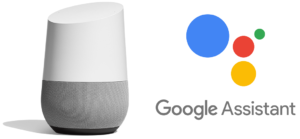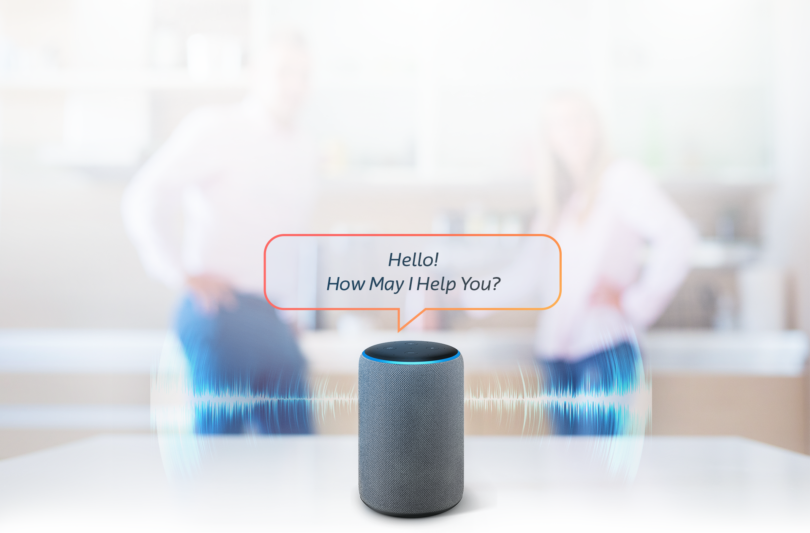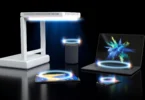AI smart home assistants has started to revolutionize the smart home business. The smartness of AI has integrated itself with human lives in the form of smart home appliances. It has started to help in reducing human efforts and enhancing living standards.
The AI technology performs various acts based on voice instructions. It starts with AI virtual assistants like Google Assistant, Siri, and Alexa and then these virtual assistants take care of the security and operations of your house.
AI smart home assistants are on the rave and trend for smart home automation.
What is the importance of smart home automation?
At the heart of smart home automation is the capability to interact with the home environment like never before. They are not limited to prestigious gizmos; they provide a plethora of advantages, which can exceed your expectations and improve your convenience, safety, and monetary position. Here’s why smart home automation and smart home assistants are becoming increasingly important:
Convenience at Your Fingertips: Think about adjusting bright and warm or whatever of your lights, temperature setting, or even doorway locks from your phone exclusively by voice. Smart home systems enable the control of tasks and adjustments through electronic devices and applications. Just picture yourself programming your oven to preheat while on your way home, or changing the light brightness as you sit on your couch- convenience taken to the extreme.
Enhanced Security: With the help of smart home assistants, the security of your home could be improved greatly. Smart locks, security cameras, and motion detectors enable you to observe your home, and its condition from a distance, and discourage potential intruders. It comes with alert options; you can be notified if there is any suspicious activity while you’re out of town.
Energy Efficiency and Cost Savings: These devices, typically designed with Wi-Fi, can interface with different appliances in a home and teach themselves your schedules and patterns to better control heating and cooling. The smart lighting systems can also be set to adjust the brightness and switch off once the room is not in use to cut energy usage still further. These aspects lead to lower power consumption, and, therefore, less expenses for electricity and other utilities, as well as a positive impact on the environment.
Improved Comfort and Personalization: Smart home assistants are technologies that enable the automation of the home. If you could set up a movie night scene, the lights would turn off, the AC would decrease, and the entertainment system would come on with just one voice command. These aspects can be adjusted to meet your unique needs and contribute to the creation of a perfect environment in the interior space.
Accessibility and Independence for All: There are many ways that smart home features can be used for those in need of aids for their disabilities. For convenience, there are voice controls or automated functions that should allow one to perform basic functions such as changing light bulbs or operating appliances. Smart home systems may increase even the level of independence as well as enhance the overall well-being of these people.
Some AI assistants to help with your Smart Home Appliances
The growth of smart homes is rapidly steady, and now artificial intelligence is guiding it as it becomes the controlling voice of homes. These devices help users control Smart Home devices with the help of voice commands, which makes your life easier and your home experience more enjoyable. Here are some of the leading AI smart home assistants:
 Amazon Alexa: Currently, one of the primary leaders of the smart home voice assistant market, Alexa, boasts impressive support for a wide variety of smart home devices. Switch on/off lights, regulate temperature using a thermostat, open or close the lock, monitor the camera, and many others through a voice command. Invoking Alexa works best with Amazon devices such as Echo smart speakers and Fire TV, and this makes for a seamless experience. Further, the Alexa Routines enable the user to make a schedule and set corresponding actions, or vice versa, for example, the “good morning” program which includes the light turning on and the coffee machine starting.
Amazon Alexa: Currently, one of the primary leaders of the smart home voice assistant market, Alexa, boasts impressive support for a wide variety of smart home devices. Switch on/off lights, regulate temperature using a thermostat, open or close the lock, monitor the camera, and many others through a voice command. Invoking Alexa works best with Amazon devices such as Echo smart speakers and Fire TV, and this makes for a seamless experience. Further, the Alexa Routines enable the user to make a schedule and set corresponding actions, or vice versa, for example, the “good morning” program which includes the light turning on and the coffee machine starting.
Rating: 4.7/5.0
Buy Now Google Assistant: Currently, Google Assistant is a very powerful contender, as it employs a notable natural language understanding engine that was designed to support dialogues and deal with intricate questions. Use voice commands to control the device of your smart home, moreover, services from Google as Google Calendar and YouTube are also integrated with Google Assistant. Nest smart home products work well with Google Assistant, so you can easily manage your thermostat, cameras, and more Nest devices. Custom scenes can also be established to perform more actions and trigger routines in a similar way that the Alexa routines do.
Google Assistant: Currently, Google Assistant is a very powerful contender, as it employs a notable natural language understanding engine that was designed to support dialogues and deal with intricate questions. Use voice commands to control the device of your smart home, moreover, services from Google as Google Calendar and YouTube are also integrated with Google Assistant. Nest smart home products work well with Google Assistant, so you can easily manage your thermostat, cameras, and more Nest devices. Custom scenes can also be established to perform more actions and trigger routines in a similar way that the Alexa routines do.
Rating: 4.5/5.0
Buy Now
 Apple Siri: Siri is a great pick for Apple fans and it has great synergy with HomeKit although it may lack certain features. Easily manage HomeKit-enabled gadgets such as thermostats, lighting systems, and doors with simple voice commands. Siri does a great job at functional duties such as scheduling a reminder and leading your schedule, so it is not just limited to smart homes. Although Siri has a somewhat limited compatibility with devices compared to devices like Alexa or Google Assistant, the user experience for Apple users is seamless.
Apple Siri: Siri is a great pick for Apple fans and it has great synergy with HomeKit although it may lack certain features. Easily manage HomeKit-enabled gadgets such as thermostats, lighting systems, and doors with simple voice commands. Siri does a great job at functional duties such as scheduling a reminder and leading your schedule, so it is not just limited to smart homes. Although Siri has a somewhat limited compatibility with devices compared to devices like Alexa or Google Assistant, the user experience for Apple users is seamless.
Rating: 4.6/7.0
Buy NowSamsung Bixby: Originally, Bixby is one of the AI smart home assistants that is a part of the Samsung Group and it is primarily used in the special Samsung Galaxy devices, both smartphones and smart speakers. Although the number of smart home devices that Bixby might support beyond the Samsung network is not very high, this assistant can effectively manage Samsung devices and Smart TVs. It’s a bonus for people who have already invested a lot of money and time in Samsung products since with Bixby, they have an opportunity to control their smart home devices easily.
Rating: 4.3/5.0
Buy Now LG ThinQ: The major platform for LG’s artificial intelligence dubbed ThinQ is embedded in LG smart appliances and television sets. Like Bixby, it may not work well with LG-only devices and it might not be developed widely for other devices. But for users having LG’s home appliances such as refrigerators, washing machines, and TVs, ThinQ will allow voice commands and the status and settings of the appliance.
LG ThinQ: The major platform for LG’s artificial intelligence dubbed ThinQ is embedded in LG smart appliances and television sets. Like Bixby, it may not work well with LG-only devices and it might not be developed widely for other devices. But for users having LG’s home appliances such as refrigerators, washing machines, and TVs, ThinQ will allow voice commands and the status and settings of the appliance.
Rating: 4.3/5.0
Buy Now
Homegrown AI Assistants: Currently, there are other platforms in the market such as Hubitat and SmartThings that have integrated AI smart home assistants. These may not be as familiar as the previously mentioned ones like Amazon’s Alexa or Google Assistant but they are designed to perfectly fit within these ecosystems. For those the primary goal of which is to control the smart home, built-in AI helpers allow interacting with all the connected devices.
The Glitches in the System: The hurdles to AI in smart home automation
Despite the opportunities that AI implies for smart homes, some limitations need to be explored to have a positive experience. Here are some key hurdles to consider:
Privacy Concerns: The advanced AI assistants rely on your data collected concerning habits and preferences to serve you better. It is especially important to ensure that such data is protected and not misused in any way.
Security Vulnerabilities: Other intriguing smart gadgets with artificial intelligence can be hacked and exploited by malicious people. Making your home secure is very important through employing of strong security measures.
Limited Understanding: Some present-day AI advisors have yet to receive a voice or may fail to process intricate instructions or natural language. This means that there are likely to be common cases of frustration and a somewhat unsavory experience when using the device.
Reliance on Connectivity: Human to AI: It is worth mentioning that many AI assistants depend on an internet connection for optimal performance. When there is a problem with connectivity, the chances are that many of the smart home gadgets could be impacted.
Limited Device Compatibility: From the list of smart home products, not all of them are compatible with all the AI assistants. On the topic of compatibility, the following are some of the drawbacks that can prevent users from getting the best of the integrated smart home experience.
The Challenge of Explainability: It can be confusing to work alongside AI assistants and understand how they arrive at making their decisions. Lack of explainability can cause dissatisfaction from the user side and become a constraint on troubleshooting.
Accessibility Issues: Silent operation is rather uncomfortable for some people, which is why voice control is not liked by everyone. Touchscreens or even physical buttons are required to be implemented as an alternative to voice commands for those who might be uncomfortable or unable to use it.
The Energy Cost: As a consequence, some AI assistants are tied to smart speakers or hubs that are permanently on, which can produce extra energy.




